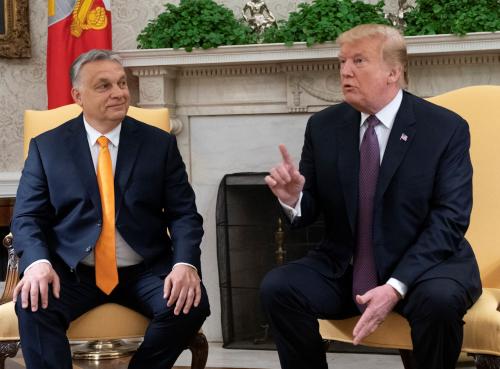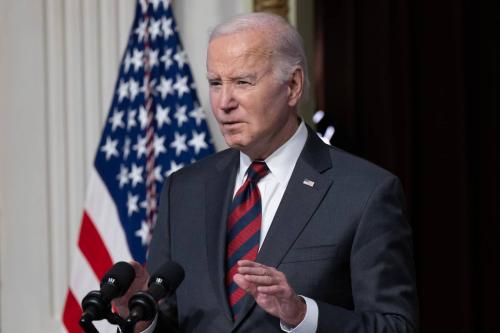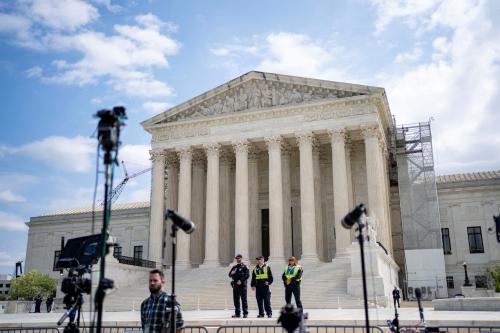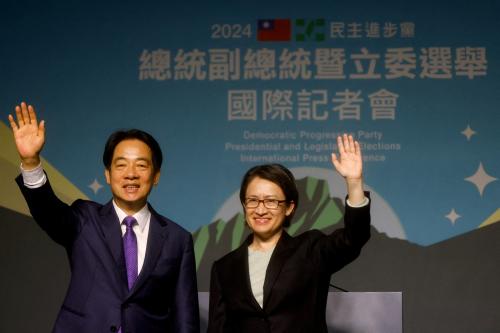Whether its genesis is slow and quiet or sudden and violent, rising autocracy threatens the most fundamental values of free people, including their rights of liberty and self-determination. Alongside the political and indeed moral implications of democratic erosion, there are economic consequences. U.S. democracy has declined in recent years, and additional erosion is possible. This paper assesses the material consequences of democratic decline and considers the role of business in preserving democratic functioning in the United States.
Democracy is a strong driver of a healthy economy. Economists have found that democratization causes an increase in GDP per capita of between 20% and 25%. Conversely, there is also indisputable evidence of the economic costs of democratic decline. These costs include stagnation, policy instability, cronyism, brain drain, and violence. Under autocratic regimes, businesses face new risks, as autocrats refashion markets to reinforce their political dominance. Common consequences are retaliatory and punitive applications of taxation, regulation, and licensure; discriminatory access to government contracts and public services; and extortionary demands for political contributions. The economic risks of autocracy are clear.
Equally clear is the vital role of business in the development of democracy. The decisions made by conservative, business-oriented parties about how to respond to the far right have been not just significant but decisive in the consolidation or failure of democracies in Europe, scholars argue.
In principle, these two factors—the economic value of democracy and the power of business—bode well for democratic resilience in the United States. But this optimistic scenario only holds if business, first, recognizes the economic dangers of democratic erosion and, second, organizes effectively in response. Historically, and to their lasting cost, business leaders have underestimated the consequences of promoting political leaders uncommitted to democratic norms. Moreover, the contemporary organization of corporate interests in the United States leaves business more poorly positioned to influence politics than one might expect. This paper concludes with recommendations for how business can overcome these challenges and encourage political stability and economic growth.
Democracy leads to economic growth
Advances in social science methodology have allowed scholars to rigorously assess the relationship between political regime type and economic outcomes. The findings are clear: Autocracy is a drag on the economy.
Recent analyses convincingly demonstrate a causal link between democracy and economic growth. One particularly thorough study comes from economists Daron Acemoglu, Suresh Naidu, Pascual Restrepo, and James A. Robinson. They looked at 175 countries between 1960 and 2010 and found democracy’s effect on growth is “significant and sizeable.” Democratization increases GDP per capita by an extraordinary 20% to 25% over the following 25 years. Even during the economic boom of the 1990s, it took the United States 10 years to achieve 25% growth in real per capita GDP.1 While there are a few prominent, stable, longstanding autocracies known for their impressive growth, these cases are the exception to the rule.
Democracy spurs growth, Acemoglu et al. find, “by increasing investment, encouraging economic reforms, improving the provision of schooling and health care, and reducing social unrest.” In identifying a causal effect of democracy, Acemoglu et al. provide a fundamental contribution to the study of political economy. Their work is consistent, however, with previous studies that identified a suite of economic gains associated with democratic practices, and with a new paper in the American Economic Review finding that populist leaders are associated with a 10% decline in GDP per capita over 15 years. In short, democracies thrive because they are better at ensuring the provision of public goods, including education, public health, and infrastructure; because they manage markets more effectively; and because they channel contestation into political compromise rather than political violence.
Aggregate results can only tell us so much, however. There is a wide variation in the structure of autocracies and the ideology of autocrats. Ideological differences have less effect on economic consequences than one might expect, however. As foreign affairs expert Rachel Kleinfeld has noted, “countries with both left- and right-wing populist leaders” experience similar rates of economic decline. A closer examination of specific cases of democratic decline, however, can illustrate exactly how rising authoritarianism can undermine economic health. The two cases presented below are those most pertinent to the United States today.
Americans do not have to look far for instances of democratic backsliding. The subnational authoritarian enclaves of the “Jim Crow” South existed in living memory for many Americans. Moreover, as many scholars have noted, the current democratic erosion within the United States is in fundamental ways a continuation of the long backlash to the Civil Rights Movement. Recent restrictions on ballot access, as well as aspects of the contemporary criminal justice system, represent a troubling echo of policies prevalent under those state-level autocracies. The Trump campaign has explicitly proposed domestic use of the military for immigration enforcement, and has defended his immigration policies by arguing that those arriving from South America, Africa, and Asia are “poisoning the blood of our nation,” evoking segregationist ideas of racial purity.2
Before turning to that domestic and historical example, however, this paper presents a comparative and contemporary case: Viktor Orban’s Hungary. The ethnonationalist politics of Orban’s ruling party, along with its gender traditionalist commitments, have allowed the regime to find many supporters on the American right.3 Former President Donald Trump celebrated Orban’s unchecked powers as evidence that he is a “fantastic” leader: “He said, ‘This is the way it’s going to be,’ and that’s the end of it. He’s the boss.” As president, Trump sought to emulate Orban in using state power to persecute his political enemies, including business leaders. The Heritage Foundation has released a plan, should the Republicans retake the presidency, to install party loyalists in positions formerly reserved for independent civil servants, which international affairs scholar Kim Lane Scheppele has described as a “direct copy of the plan that Viktor Orban used to take over the Hungarian government in 2010.”
Instability, cronyism, and brain drain in Orban’s Hungary
Since 2010, Prime Minister Viktor Orban has worked to undermine Hungary’s democracy, squelching public debate and media freedom, reducing the independence of the judiciary, eliminating civil rights protections, and co-opting the institutions of election administration. Though elections still occur in Hungary, they are so unfair that scholars describe the regime as an “electoral autocracy.” Hungary’s economy has struggled in recent years and its problems are exacerbated by the democratic erosion that has occurred in the country.4 The most significant economic consequences of the slide toward authoritarianism are instability, cronyism, and brain drain.
Orban’s economic policies, which veer from price controls to corporate giveaways, are untethered from a consistent vision of how the economy works; instead, decisions are driven by a desire to consolidate power, reward allies, or undermine opponents. For example, Orban’s telecommunications policies, from taxation to licensure, have been used to stifle political dissent. In 2014, a few years after suddenly raising taxes on the telecommunications sector, Orban used a license renewal process to pressure the country’s leading telecommunications company to shut down one of the most prominent independent news sites in Hungary, one that had persistently reported on corruption in Orban’s party. In 2022, Orban used his new emergency powers to again apply a range of unexpected corporate taxes, imposed a new small-business tax system “without public consultation,” and also suddenly reversed his election-year energy price caps. Because power in Hungary is so personalized, policymaking is idiosyncratic, unstable, and difficult to predict.
According to Freedom House, the “success of a business” in Hungary is “somewhat dependent upon its owner’s government connections.” The regime has the highest public corruption of any European Union country, according to Transparency International. Orban’s close friends and family have benefited immensely. For example, Orban’s government directed the sales of state lands to his friends and immediate family, ensuring their access to millions in E.U. subsidies. As one corporate analyst noted of Orban’s farm program, a “ conspicuous beneficiary was his wife.” Hungary now has an oligarchic class that is “a miniature version of Putin’s Russia.” Critics of the government face surveillance and harassment, punitive investigations, and audits. But the costs of cronyism are not borne simply by the dissidents and the political outsiders; self-dealing depresses the economy as a whole.
Hungary is also experiencing a marked “brain drain,” as educated Hungarians leave for better-paying jobs in freer countries. A country of less than 10 million people, Hungary lost nearly 50,000 people to emigration in 2019, a rate high enough that, in combination with strict immigration limits, has resulted in overall population decline. Emigration is now 10 times higher than after Hungary joined the European Union, indicating that the driver of emigration is not simply access to better-paying jobs in western Europe. Those leaving the country are young and highly educated and staff key industries. Emigrating doctors have at times outnumbered medical school graduates in Hungary. Labor shortages are damaging industry, with substantial effects on foreign investors. As early as 2015, nearly one in two businesses were reporting having a hard time staffing open positions.
Violence, poverty, and stagnation in the “Jim Crow” South
Further evidence of the connection between democracy and economic growth can be found within the United States. Until about 60 years ago, the South operated under a system of racist misrule, commonly called “Jim Crow,” that undermined the regional economy.
Until the movement for Black civil rights began to bear fruit, the American South—despite its rich natural resources and substantial industrialization—remained deeply impoverished: marked by low wages, low productivity, low education levels, and even malnutrition.5 The Southern states experienced massive outmigration, which resulted in a “brain drain” as educated people, Black and white, immigrated to the North and West. Without an educated workforce, the South’s main appeal to business was its cheap labor. Instead of fostering a “bustling commercial, middle-class society,” states attracted industry “geared to the maintenance of general impoverishment.” Low labor costs reduced the incentive for innovation and development, reducing profitability. Those limited profits tended to accrue to non-Southerners. In sum, “the South’s lack of emphasis on formal education slowed both investment and growth.”
The languishing economy was a direct consequence of the autocratic state regimes. First and foremost, the one-party states of the South existed to preserve white supremacy and enforced that racial hierarchy through state violence and state-sanctioned violence. About 3,000 Black people were lynched in the Southern states during Jim Crow period,6 and white mobs destroyed prosperous Black communities. The oppression cost the region and the nation—not only by destroying Black property and Black lives, but by chilling Black innovation. Economist Lisa Cook has found that, nationally, riots and lynchings “depressed patent activity among blacks by more than 15% annually.” Moreover, economic policies, like educational investments, that had the potential to broadly improve the economy were often rejected on the grounds that such policies might upset the racist social order. Censorship and self-censorship was common; in Virginia, for example, the State Board of Censors demanded edits to movies shown in the state, including, in 1939, a film about resistance to the Nazi regime.
Because the exclusion of Black Americans from Southern political life was achieved via the destruction of party competition and systematic disenfranchisement, Southern governance collapsed into inertia and dysfunction, as the one-party states devoted themselves to self-dealing and special interests. As historian V.O. Key put it in 1949, “the South as a whole has developed no system or practice of political organization and leadership adequate to cope with its problems.”
That the stagnation of the South was fundamentally a political problem is indicated by the reversal of economic fortunes that occurred in the later 20th century. The South prospered when New Deal legislation, the Second World War, and then the Civil Rights Movement disrupted the Jim Crow system and eventually overturned the legal framework that supported segregation and one-party white supremacist rule.7 The income gap between the South and the rest of the nation finally began to converge. Though vestiges of the Jim Crow stagnation remain, particularly in educational attainment, the South rapidly became a region of extraordinary economic vibrance.
Seven kinds of business at highest risk
The risks of autocracy are not borne equally across all businesses. Some businesses find privileged positions within an autocrat’s innermost circle or beyond their reach. Businesses run by the family or close friends of an autocrat prosper, of course—though positions among the inner circle can be highly unstable, and those who fall from favor can face dire consequences. In both Orban’s Hungary and the Jim Crow South, some industrialists outside the autocratic region saw benefits; German automakers have profited from cheap labor in Hungary, as Northern mill owners did in the Deep South. Under Orban, however, multinationals have also been a target of unexpected and punitive regulatory and tax policies.
As democracy erodes, most businesses face substantial costs. Drawing on the data and cases presented above, we can identify certain sectors and business models that face especially high risks in conditions of democratic erosion.
- Businesses with high exposure to government decisions: Businesses that rely on government contracting or licensure, or that are exposed to audits or regulatory control, are particularly easy targets for would-be autocrats.
- Businesses reliant on public investments or public services: Businesses that use government data may find that data less reliable, if accurate data is perceived as damaging to the party in power. Businesses that use public services may confront discrimination in access to those goods or a decline in quality due to disinvestment.
- Businesses investing on a longer time horizon: Because of the policy instability that often accompanies democratic erosion, businesses that need to make long-term investments—for example, businesses that make difficult-to-move capital investments—are at particular risk.
- Businesses reliant on a highly educated labor force: Brain drain is already an issue in many states. Younger workers with high levels of human capital tend to gravitate to places with strong public goods provision and take political environment into account in their job searches.
- Businesses in media, entertainment, and communications: Control of public discourse is a key strategy for political leaders seeking to increase their power, and so would-be autocrats typically seek to dominate businesses in the media, entertainment, and communications sectors, including both the producers of media content and the owners of media channels and systems.
- Businesses in science, medicine, and education: Facts can endanger an autocratic regime, either by revealing government failures or by undermining the regime’s self-justifying mythos. Businesses in the realm of science, medicine, and education are therefore likely to receive high levels of scrutiny and efforts at control.
- In-person businesses and businesses in tourism. Businesses that rely on customers showing up in person may see profit declines if an area experiences political or ethnic violence. The chilling effect can apply to whole neighborhoods, cities, and even states, as potential customers opt to avoid places that have developed a reputation for civil rights abuses, political instability, or political violence.
The role of business in the preservation of democracy
Democratization causes economic growth. Democratic decline is associated with a panoply of economic “bads,” including instability, brain drain, stagnation, and kleptocracy. We might therefore imagine that business interests would be highly motivated to oppose democratic erosion in the United States. Given that the economic elite are widely recognized to have a great deal of political power, we might further imagine that business would place a heavy thumb on the pro-democracy side of the scale. There is good evidence to suggest that business can play this critical role—but there remain serious and underappreciated challenges to business organizing to support electoral democracy.
We have seen American business interests take some steps to protect democratic functioning in the United States. In the immediate aftermath of the 2020 election, for example, while concerted efforts were underway to subvert the election’s outcome, the U.S. Chamber of Commerce joined with the AFL-CIO and faith leaders in calling for all votes to be counted. In addition, dozens of major corporations pledged to cease campaign contributions to those legislators who had voted to overturn the election outcome—though many have since reneged on those commitments. My colleagues Bill Galston and Elaine Kamarck have rightly noted corporate divestment from South Africa as a potential model for how the private sector can strengthen democracy, a case that indicates how important ongoing pressure from grassroots advocacy groups can be in pushing and sustaining corporate action.
The significance of these decisions is particularly obvious in historical perspective. The political organization of business has often played a critical role in the development of democracy. As political scientist Daniel Ziblatt argues, the success of democratic reforms often rests on the willingness of conservative political parties to accept the new system. Business represents a core constituency of the center right. When business-aligned conservative parties participate in democratic systems and work to sideline and isolate the anti-democratic far right, countries become stable democracies.
It is important, however, to recognize the limits of contemporary business organizing. For one, it is not guaranteed that business leaders will recognize their economic interest in preserving democratic functioning. There is a substantial academic literature identifying ways in which business leaders’ judgements are skewed and demonstrating how biased or reactive management can lead to less-than-optimal outcomes. Historically, business leaders have often tragically misjudged the risks of supporting authoritarians. As conservative Washington Post columnist Jennifer Rubin has written, they wrongly “imagine they can cut deals with autocrats or that persecution of disfavored groups will have no impact on the business environment. The economic and political upheaval an autocrat brings never fails to surprise those who insisted they could control him.”
Should business leaders decide that “giving up the rule of law is good for business,” says international affairs scholar Kim Lane Scheppele, “they will quickly learn that they are wrong. But it will be too late.”
Even if business recognizes its interest in the preservation of electoral democracy, moreover, the organization of American business is in some ways profoundly weak. This claim may be counterintuitive, given that the economic elite have a great deal of power over policymaking in the United States. Political scientists have quantified what many political observers know instinctively: that business interests are heavily overrepresented among lobbying and advocacy groups and that policy decisions conform to the preferences of business interests and the wealthy over those of lower- and middle-income Americans.
However, the power of corporate interests is more negative than positive. In our gridlocked political system, it is far easier to prevent government action than to spur greater government intervention. Business lobbyists often excel at carving out tax loopholes or weakening regulatory oversight, but as political scientist Cathie Jo Martin has demonstrated, they “are less well equipped to act on shared social concerns.” In fact, business has in recent years been quite poor at mobilizing for health care reform, education investments, or new immigration policy, even when business leaders are firmly convinced that the proposed changes would help their bottom line.8
Why? A longstanding limitation of business organizing for broad public goods is that different industries and sectors often have competing policy goals. But a more significant limitation, in recent decades, stems from changes in the political organization of business.
In the mid-20th century, business’s political engagement was balanced by a strong union movement. Business during this period provided significant and sometimes decisive support for what sociologist Mark Mizruchi calls “moderate, pragmatic solutions to pressing economic and social problems,” noting the role of business in the development of the Marshall Plan, the massive scientific investments that underwrote the “space race,” and even some expansions to New Deal and Great Society programs.
But starting in the 1970s, the more ideological wing of business, which had long sought to overturn the New Deal, displaced the earlier model of pragmatic business engagement. As Jacob Hacker and Paul Pierson have written, business interests began to dramatically increase their lobbying activity and campaign expenditures, rapidly outstripping the declining influence of organized labor. Longstanding business organizations became substantially more ideologically extreme, and new conservative lobbying groups emerged in the states, bankrolled by corporate largesse. To the extent the official institutions of business are captured by highly ideological or partisan interests, it blunts the capacity of those organizations to represent the breadth of their constituencies.
Finally, the capacity of business to isolate far-right voices is limited by the decay of the Republican Party itself. In the words of political scientists Daniel Schlozman and Sam Rosenfeld, both political parties today have been hollowed out. In the Democratic Party, this hollowing has led to inertia. In the Republican Party, this has resulted in a decades-long rightward shift. The formal parties do not hold the campaign purse strings, nor do they cultivate an active base of grassroots participants; those roles have been overtaken by a pottage of issue activists, wealthy donors, and media organizations. It is not at all obvious how constituencies can redirect these new, amorphous political conglomerations—even when the constituency is as central to the party coalition as business is for the Republican Party.
Two recommendations
Given the significance of democratic functioning for economic health, and the potential power of business to play a key role in forestalling autocratization, it is critical that business stand ready to use its substantial political clout to preserve electoral democracy. Business institutions and leaders need to be better informed about the economic value of democracy and better organized to protect the economic gains that democracy makes possible.
Education for business leaders:
Much has been written about democracy and democratic decline in recent years, but only a small fraction of that has focused on the economic stakes or on business organizations as political players. Experts should elucidate the likely economic consequences of democratic erosion, ensure business leaders can distinguish clearly between normal partisan policy disputes and dangerous challenges to the system of government itself, and articulate the effect democratic decline can have on the way businesses interact with government.
This process of education is vital because facially similar political processes can have very different implications under democratic and non-democratic conditions. For example, financial contributions to a candidate or party expecting to compete in competitive elections can have the effect of increasing the candidate’s attention to the donor’s concerns. In places without competitive elections, however, political contributions often cease to empower the donor. Instead, the regime accrues contributions in an extortionary manner. Money procures not access, but the avoidance of punishment.
Relatedly, it is important to distinguish the implication of policy defeats under competitive elections from policy defeats under authoritarianism. Under a democratic system, a constituency that loses out in a policy battle—for example, by seeing their taxes increase or government benefits decline—remains free to organize to overturn this decision in the next election. By contrast, a policy defeat under authoritarianism has no inherent timeline for re-contestation.
Revitalized business organization:
There is a strong need for more robust nonpartisan business associations that are explicitly and actively committed to protecting democratic institutions, as well as greater engagement on the part of existing business associations to preserve electoral democracy.
New business organizations may need to be organized geographically, since certain states have seen substantially more backsliding than others, or sectorally, since certain industries and sectors are at highest risk. As social scientists Alexander Hertel-Fernandez and Theda Skocpol have demonstrated in their study of state Medicaid expansion, state business networks were effective advocates for reform, at times defeating national, ideologically-driven business institutions.
Business organizations could increase understanding of the economic value of democracy among their membership and in the public at large. Much more could be done to ensure wider awareness of the business-relevant research on political economy through existing seminar series, industry and sector conferences, in-house publications, and the business press.
Business organizations could also develop and promote best practices for political engagement in periods of democratic erosion. For example, business organizations could, in consultation with experts on authoritarianism, develop advice on how to avoid encouraging democratic erosion via their political contributions and lobbying practices. Many businesses already encourage voting by their employees, via voter registration drives at work or generous time off policies on Election Day. Going further, business associations could turn their substantial lobbying might to the cause of voting rights protections or better funding for election administration.
Business organizations could also coordinate with other civil society groups to call for compliance with basic standards of electoral democracy, such as ensuring all votes are counted and that election administrators are not threatened during the vote-counting process. Finally, as a widely trusted institution, business can reinforce accurate information about election results simply by responding in traditional ways—for instance, by congratulating the legitimate winner of an election, as a number of business groups did after the 2020 election.
Conclusion
Though the paper demonstrates the economic case for democracy, the case for democracy is not an economic one. As John Stuart Mill argued, those living under even the most benevolent despot suffer because they are without “any potential voice in their own destiny.”
But the material consequences of our politics matter. If the United States were to experience substantial further democratic decline, there is strong evidence that the resulting instability, cronyism, and stagnation would substantially damage the economic health of the country. Business has traditionally played a pivotal role in the consolidation of democracy and should continue to fulfill this responsibility today. Individual business leaders and their institutional representatives have a strong incentive to reinforce democracy in the United States and should move to address the educational and institutional barriers to that important work.
-
Acknowledgements and disclosures
Thanks to Itai Grofman, Ellis Chen, and Zach Benzaoui for their excellent research assistance.
-
Footnotes
- See growth between Q4 1990 and Q4 2000.
- In Mein Kampf, Adolf Hitler also refers to immigration as resulting in the poisoning of a nation’s blood. The racist policies of the American South were a source of inspiration to the Nazi regime.
- In 2021, Fox News host Tucker Carlson broadcast his show from Budapest, which included an obsequious interview with the prime minister. The following year, Orban was invited to give the opening address at the Conservative Political Action Conference; his speech made headlines for his stated opposition to “mixing races.” Former Trump strategist Steve Bannon described Orban as a “hero.”
- Rachel Kleinfeld’s 2023 report, “How Does Business Fare under Populism,” includes a detailed case study of Hungary’s political and economic decline and also examines the economic costs of populism in India and Brazil.
- Pellagra, a disease caused by niacin deficiency, killed at least 100,000 people between 1906 and 1940. Ninety percent of cases were reported in the South, though several Southern states known to have pellagra epidemics refused to report data on the disease. Embarrassed by the association between the disease and poverty, Southern politicians denied the severity of the disease and derided doctors arguing that the cause was poor nutrition. Bollet, Alfred Jay. “Politics and Pellagra: The Epidemic of Pellagra in the U.S. in the Early Twentieth Century.” The Yale Journal of Biology and Medicine 65 (1992): 211–21.
- The NAACP introduction to the history of lynching uses the data of the Tuskegee Archives, available by state and race here.
- For a somewhat different view on Southern economic change preceding the Civil Rights Movement, see Shafer, Byron E., and Johnston, Richard. The End of Southern Exceptionalism: Class, Race, and Partisan Change in the Postwar South. United Kingdom, Harvard University Press, 2009.
- Peter Swenson (2018) provides an illuminating review of the scholarly debate on the degree to which business interests have shown genuine support for major welfare state initiatives and to what extent that support has mattered for passage.









